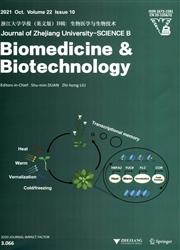螺旋藻水提物通过抑制炎症和氧化应激改善溃疡性结肠炎小鼠结肠黏膜损伤和调节肠道菌群紊乱
IF 4.7
3区 生物学
Q1 BIOCHEMISTRY & MOLECULAR BIOLOGY
引用次数: 10
摘要
溃疡性结肠炎(UC)是一种慢性和复发性炎症性肠病(IBD),近几十年来已成为一个主要的胃肠病学问题。许多复杂的因素涉及UC的发展,如氧化应激,炎症和微生物群紊乱。这些因素加剧了肠黏膜屏障的损伤。螺旋藻(Spirulina platensis)是一种具有多种生物活性的商业藻类,被广泛用作食品和饮料产品的功能性成分。然而,目前关于平棘水提物(SP)治疗UC的研究较少,SP对UC的作用机制也尚未阐明。在此,我们旨在研究SP对UC小鼠微生物群紊乱的调节作用,并阐明SP减轻肠黏膜屏障损伤的潜在机制。采用硫酸葡聚糖钠(DSS)建立正常人结肠上皮细胞(NCM460)损伤模型和UC动物模型。采用线粒体膜电位法3-(4,5-二甲基噻唑-2-基)-2,5-二苯基溴化四唑(MTT)、Annexin v -异硫氰酸荧光素(FITC)/碘化丙啶(PI)染色和Hoechst 33258检测SP对NCM460细胞损伤模型的影响。采用苏木精和伊红(H&E)染色、透射电镜(TEM)、酶联免疫吸附试验(ELISA)、实时定量聚合酶链反应(qPCR)、western blot、16S核糖体DNA (rDNA)测序等方法,探讨SP对C57BL/6小鼠UC的影响及其作用机制。体外研究表明,SP可减轻dss诱导的NCM460细胞损伤。SP还能显著减少细胞内活性氧(ROS)的过量产生,防止DSS刺激后线粒体膜电位的降低。体内研究表明,与对照组相比,SP可减轻dss诱导的结肠黏膜损伤的严重程度。sp处理后,炎症和氧化应激的抑制与抗氧化酶活性和紧密连接蛋白(TJs)表达的增加有关。SP改善肠道菌群紊乱主要是通过提高结肠中抗氧化酶活性和TJs的表达。我们的研究结果表明,SP对UC的保护作用是基于其抑制促炎细胞因子的过度产生,抑制dss诱导的ROS的产生,以及增强结肠粘膜屏障中抗氧化酶和TJs的表达。本文章由计算机程序翻译,如有差异,请以英文原文为准。
Spirulina platensis aqueous extracts ameliorate colonic mucosal damage and modulate gut microbiota disorder in mice with ulcerative colitis by inhibiting inflammation and oxidative stress
Ulcerative colitis (UC) is a chronic and recurrent inflammatory bowel disease (IBD) that has become a major gastroenterologic problem during recent decades. Numerous complicating factors are involved in UC development such as oxidative stress, inflammation, and microbiota disorder. These factors exacerbate damage to the intestinal mucosal barrier. Spirulina platensis is a commercial alga with various biological activity that is widely used as a functional ingredient in food and beverage products. However, there have been few studies on the treatment of UC using S. platensis aqueous extracts (SP), and the underlying mechanism of action of SP against UC has not yet been elucidated. Herein, we aimed to investigate the modulatory effect of SP on microbiota disorders in UC mice and clarify the underlying mechanisms by which SP alleviates damage to the intestinal mucosal barrier. Dextran sulfate sodium (DSS) was used to establish a normal human colonic epithelial cell (NCM460) injury model and UC animal model. The mitochondrial membrane potential assay 3-(4,5-dimethylthiazol-2-yl)-2,5-diphenyltetrazolium bromide (MTT) and staining with Annexin V-fluorescein isothiocyanate (FITC)/propidium iodide (PI) and Hoechst 33258 were carried out to determine the effects of SP on the NCM460 cell injury model. Moreover, hematoxylin and eosin (H&E) staining, transmission electron microscopy (TEM), enzyme-linked immunosorbent assay (ELISA), quantitative real-time polymerase chain reaction (qPCR), western blot, and 16S ribosomal DNA (rDNA) sequencing were used to explore the effects and underlying mechanisms of action of SP on UC in C57BL/6 mice. In vitro studies showed that SP alleviated DSS-induced NCM460 cell injury. SP also significantly reduced the excessive generation of intracellular reactive oxygen species (ROS) and prevented mitochondrial membrane potential reduction after DSS challenge. In vivo studies indicated that SP administration could alleviate the severity of DSS-induced colonic mucosal damage compared with the control group. Inhibition of inflammation and oxidative stress was associated with increases in the activity of antioxidant enzymes and the expression of tight junction proteins (TJs) post-SP treatment. SP improved gut microbiota disorder mainly by increasing antioxidant enzyme activity and the expression of TJs in the colon. Our findings demonstrate that the protective effect of SP against UC is based on its inhibition of pro-inflammatory cytokine overproduction, inhibition of DSS-induced ROS production, and enhanced expression of antioxidant enzymes and TJs in the colonic mucosal barrier.
求助全文
通过发布文献求助,成功后即可免费获取论文全文。
去求助
来源期刊

Journal of Zhejiang University SCIENCE B
生物-生化与分子生物学
CiteScore
8.70
自引率
13.70%
发文量
2125
审稿时长
3.0 months
期刊介绍:
Journal of Zheijang University SCIENCE B - Biomedicine & Biotechnology is an international journal that aims to present the latest development and achievements in scientific research in China and abroad to the world’s scientific community.
JZUS-B covers research in Biomedicine and Biotechnology and Biochemistry and topics related to life science subjects, such as Plant and Animal Sciences, Environment and Resource etc.
 求助内容:
求助内容: 应助结果提醒方式:
应助结果提醒方式:


